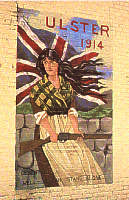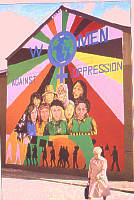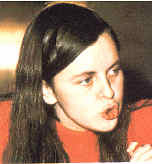
Loyalist wall painting
Photo by Bil Rolston

Nationalist wall painting
Photo by Bil Rolston
|
1969 Serious civil disturbances began and British troops were deployed in Northern Ireland 1996 Multi-Party Peace Talks begin |
A group called People's Democracy organised a march from Belfast to Derry in January 1969 to protest against discrimination in Northern Ireland. Bernadette Devlin was one of the student leaders of the march which was ambushed by loyalist mobs at Burntollet. Now the aims of those who marched to air their grievances were being frustrated by sectarian rioting, police violence, paramilitary involvement and repressive measures. Hopes for resolution of injustice in Northern Ireland by peaceful protest were fading.
When British troops were deployed in August 1969, Nationalist women welcomed them at first in preference to the Royal Ulster Constabulary (RUC). However, many turned against the troops later as continued rioting resulted in curfews, searches and internment without trial. Most working class women took sides with their own communities. Men likely to be arrested got time to escape as women, whistling and banging dustbin lids, warned them of approaching armoured cars.
While armed conflict is traditionally a male activity, the IRA made conscious efforts to recruit women both as members and as supporters. It is believed that other paramilitary groups did so to a lesser extent but comparatively few women were convicted of murder or violent assault during the Troubles. There were 236 women in Armagh Jail in 1976, convicted or interned without trial, mostly for aiding and abetting violence, storing and transporting arms and ammunition and harbouring wanted men.
Marion and Dolours Price were among eight people who got life sentences for a car bomb explosion in London in 1973. Their 206 day hunger strike (which included 167 days of force-feeding) in Brixton Prison was highly publicised and after some time they were returned to Armagh Jail from where they were released on humanitarian grounds in 1980 and 1981. Mairéad Farrell was one of three persons shot dead in Gibraltar in 1988 while allegedly implicated in paramilitary activities.
Over three hundred female deaths were attributed to the campaigns of violence, as were over three thousand male deaths. People in Northern Ireland have suffered in a great variety of ways, impossible to quantify adequately. Annie Maguire of the Maguire Seven had her false conviction overturned in 1991 after spending several years in prison.
Women have been active in attempts at reconciliation in the well-known Corrymeela Centre in Co. Antrim and in other projects. Three Maguire children were killed and their mother wounded by a car driven by an injured gunman in 1976. This incident motivated Mairéad Corrigan, the children's aunt, to join with Betty Williams in organising a Peace March and founding the Peace People. The two women, one Catholic, the other Protestant, were jointly awarded the Nobel Peace Prize the same year but the movement later declined because of problems with funds and administration.
Uniting women in Northern Ireland across the religious and political divides over issues such as poverty, domestic violence and problems specific to women, has not been easy because they may give, or be expected to give priority to nationalism or unionism instead. Some women are held in fear and control in their homes and neighbourhoods, while relationships and marriages which cross these divides can result in punishment injuries and even murder. Nevertheless, many women are involved in community groups and a Women's Information Group set up in 1980 allowed women from both communities to meet and share information and problems. New opportunities opened up for many who availed of the Women's Education Project and more women reached across religious and cultural divides.
Contacts between the Falls Road Women's Centre and the Shankill Hummingbird Centre ultimately resulted in their joint invitation to President Mary Robinson to visit Belfast in February 1992. This visit resulted in the Women's Support Network to unite women's groups in Northern Ireland.
A distinctive feature of Northern Ireland culture is the use of wall paintings to convey ideals, ideologies and loyalties. They occasionally feature women.
 Loyalist wall painting Photo by Bil Rolston |
 Nationalist wall painting Photo by Bil Rolston |
The proportion of women who achieved political office in Northern Ireland is extremely small but some women have played significant roles.
The first woman leader of an Irish political party was Anne Dickson, who succeeded Brian Faulkner as leader of the Unionist Party of Northern Ireland in 1976.
|
Bernadette Devlin was elected Westminster MP for Mid-Ulster in 1969 and took her seat on her twenty-second birthday, the youngest ever woman MP in the UK parliament. She lost her seat in 1974 but remained vocal on republican issues. Margaret Thatcher, in her career as Prime Minister of the UK from 1979 to 1990 took a hard line on many issues. For instance, she rigidly refused to relent on the issue of political status for prisoners in Northern Ireland in 1981, even when ten men died on hunger strike. However, in 1985 she signed the Anglo-Irish agreement with Taoiseach Garret Fitzgerald. |
 Bernadette Devlin |
Sinn Féin guaranteed 8 of the 32 seats on their executive to women in 1983 and one third of Alliance Party candidates for local government elections in 1992 were women.
The Northern Ireland Women's Coalition (NIWC) was established in 1996 as a non-sectarian coalition of women with an agenda of reconciliation, inclusion and equality and Pearl Sagar and Monica McWilliams were elected as delegates to the Multi-party Peace Talks that year.
Elections to the Northern Ireland Assembly were held in 1998 and thirteen women were amongst the 108 members elected: 4 Sinn Féin; 3 SDLP (later 4 when Annie Courtney replaced John Hume); 2 NIWC; and one each Alliance, DUP, Independent Unionist and UUP.
Six NIWC members contested the elections and the two members elected were Monica McWilliams and Jane Morrice. Both were founder members of the NIWC and Monica McWilliams had been the only woman signatory to the Good Friday Agreement.